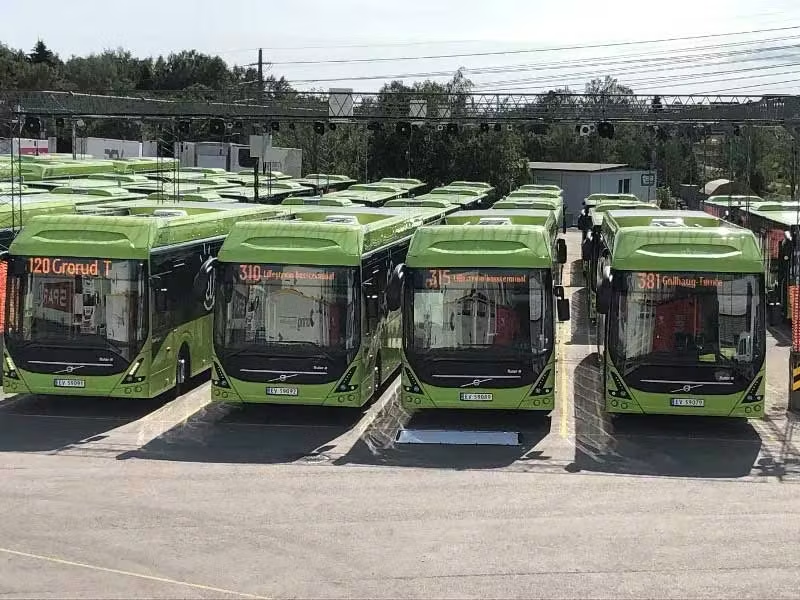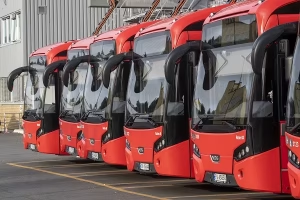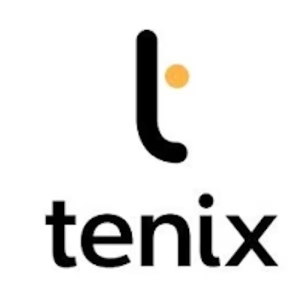As the UK transitions to electric vehicles (EVs), the importance of effective yard and depot management has never been clearer. For companies managing electric bus and truck fleets, optimising yard operations is crucial for improving efficiency and facilitating a smooth shift to greener alternatives. Tenix is dedicated to helping fleet operators navigate these challenges with innovative solutions that streamline management processes.

Understanding Yard Management
Yard management involves coordinating all tasks within a fleet’s depot or facility to ensure efficient vehicle operation while adapting to capacity constraints. Key responsibilities include:
- Preparing vehicles for their next scheduled departures
- Monitoring the health and status of charging infrastructure
- Coordinating parking spaces to manage depot traffic effectively
- Optimising charging procedures and fleet activities
- Implementing necessary security measures
Effective yard management enables fleet operators to maximise limited space while maintaining smooth workflows.
Key Challenges in Yard Management for Electric Fleets
Limited Depot Space
A pressing challenge for electric transit fleets is the scarcity of depot space. The need for additional charging infrastructure complicates space management. Strategic placement of charging stations is essential to enhance routing efficiency and minimise congestion within the depot.
Scheduled Parking Logic
With limited parking, implementing a schedule-based parking logic is vital. This approach ensures that buses are parked according to their next departure times, reducing the risk of blocking other vehicles. By aligning parking with departure schedules, fleet operators can optimise yard space, prevent delays, and streamline operations.
Charging Capacity
Ensuring adequate charging capacity at parking spots is another significant consideration. If multiple buses share a charger, capacity may be limited, potentially impacting charging completion. Effective yard management must account for how many vehicles use a charger, ensuring each bus receives sufficient power.
Real-Time Parking Assignments
Assigning parking spots in real-time as drivers arrive can significantly enhance operational efficiency. Utilising apps or digital signage, fleet operators can direct drivers to available spaces, minimising time spent searching for parking and maintaining an organised yard.
Adapting Operations
Transitioning from internal combustion engine (ICE) vehicles to electric vehicles requires major adjustments in yard operations. Fleet managers must incorporate charging times into schedules, ensuring vehicles are ready for their routes. This necessitates careful planning and coordination with utility companies to establish a reliable charging infrastructure.
Rising Energy Costs
While electric vehicles generally have lower operating costs, managing energy expenses is crucial. Tariffs can vary by time of day, making it essential for fleet operators to understand their energy pricing structures and efficiently manage charging schedules to mitigate costs.
Real-Time Battery Surveillance
Implementing real-time battery surveillance adds a vital layer of efficiency. Continuous monitoring of battery health and charge levels allows fleet operators to proactively manage charging and prevent unexpected downtime, ensuring vehicles are always ready for their next journey.
Safety in Yard Management
Safety is paramount in yard management. Clear safety protocols, such as designated walkways and proper signage, help prevent accidents. Training staff on safe vehicle handling and emergency procedures is essential. Additionally, technology like surveillance cameras and motion sensors can enhance security and create a safer working environment.
The Benefits of Yard Management Software
To address these challenges, yard management software is instrumental in enhancing operational efficiency:
- Real-Time Monitoring: Provides fleet operators with visibility of vehicles and charging stations, allowing for effective coordination between yard managers and drivers, ensuring timely departures and minimising delays.
- Charger Oversight: Monitoring charger status is crucial. Software can alert operators to faults, helping maintain optimal charging operations and prevent service disruptions.
- Space Optimisation: Real-time insights into depot layouts enable operators to manage space efficiently, crucial in facilities with limited capacity.
- Enhanced Route Planning: Integrating yard management with route scheduling ensures that all departing vehicles are charged and ready, enhancing punctuality and improving the overall passenger experience.
Tenix Solutions for Fleet Charging, Management, and Maintenance
At Tenix, we recognise the complexities of managing electric fleets. Our solutions simplify fleet charging, management, and maintenance, providing operators with tools to enhance efficiency and reduce operational costs. Our systems enable effective management of charging infrastructure, optimising energy use and ensuring electric buses and trucks are powered by clean energy sources.
By leveraging data analytics, Tenix empowers fleet operators to make informed decisions regarding vehicle operations, charging schedules, and depot management. With a commitment to innovation and sustainability, Tenix offers ongoing support to help fleet operators adapt to the evolving landscape of electric transportation.
Conclusion
As the transport industry shifts towards electric vehicles, effective yard management is crucial for operational success. By implementing advanced yard management software and utilising Tenix’s innovative solutions, fleet operators can enhance efficiency, lower costs, and support the transition to sustainable transport.
Together, we can streamline yard management processes and drive the future of sustainable transportation.


